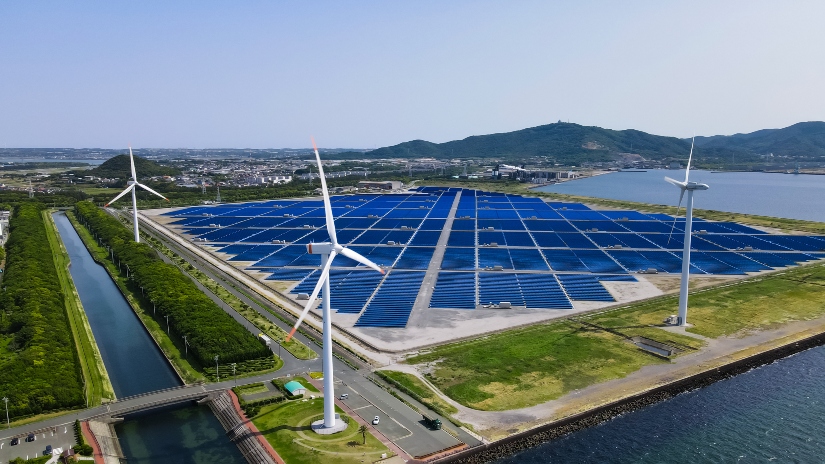By Hicham Abdessamad, Chairman and CEO of Hitachi America, Ltd., and
Anthony Allard, Head of Hitachi Energy North America
As the source of 27% of global carbon emissions,1 the transportation industry was featured prominently at the United Nations Climate Change Conference in Glasgow (COP26).2 Hitachi, a Principal Partner of COP26 in 2021, welcomed the opportunity to exchange ideas and insights with 120 world leaders and more than 40,000 participants. A proponent of environmental solutions built on public-private partnerships (PPPs), Hitachi has long advocated for the science behind, solutions for and political actions required to address climate change and secure a sustainable future. In fact, one month before COP26, the company launched Hitachi Energy — the successor to Hitachi ABB Power Grids — whose mission in part is to help expand, modernize and digitalize electrical grids to support carbon-neutral transportation innovations. Hitachi is proud to be part of this holistic approach, which is essential to developing the infrastructure required to support a sustainable future in transportation.
Among Hitachi’s guiding principles is the belief that technological innovation should improve people’s lives. Within the transportation sector, this translates to companies playing a leading role in initiatives such as supporting electric vehicle (EV) manufacturers, building charging stations and associated infrastructure, and managing the energy systems required to meet an unprecedented rise in demand. Hitachi is a driver of this movement and has identified four steps that will move the world closer to carbon-neutral transportation:
The transportation decarbonization challenge is bigger than any one company, team or individual. It will require partnerships among stakeholders across the supply chain and coordinated efforts to deliver scalable solutions. Diversity of stakeholders is key; every sector must contribute for sustainable transportation to become a reality. The breadth of the value chain encompasses stakeholders as diverse as:
The first step toward transitioning to a green economy is bringing together these stakeholders in a collective, coordinated, comprehensive effort across the value chain. Through commitment and collaboration, these partnerships can become the catalyst behind sustainable change and a carbon-neutral future.
When it comes to the electrification piece of the puzzle, data plays a game-changing role. Not only must the electrical grid scale to meet a massive increase in usage, but it must be digitalized so that the grid can be managed proactively to ensure optimal flexibility, reliability and resilience. Advanced technologies that can make the best use of the wealth of data available will be essential in the success of digitalization. This need is becoming more pressing as climate change continues to exert new pressures on the grid infrastructure.
In addition, we must successfully navigate a shift to drawing on renewable sources for a much greater proportion of energy delivered via the grid — powering EVs with electricity from fossil fuel–burning power plants is not an option. And the wide-scale transition to EVs will require careful orchestration of factors such as operating and maintenance costs, financing, and regulatory concerns, as well as alignment of critical capabilities such as energy storage, charging infrastructure and timing, grid capacity, and more.

There will be a period of time in which two environments with very different parameters — internal combustion and EV — will coexist. The challenge will be to seamlessly integrate EVs into existing fleets while managing both types of vehicles simultaneously to provide full visibility and efficient operations during the transition period. Hitachi is already providing expert guidance to companies as they integrate EVs into their existing fleets and manage both the new and legacy vehicles efficiently.
There will also be a learning curve related to electric fleet management, including best practices in charging, strategies for optimizing battery life and remote monitoring of vehicle health — an area in which Hitachi continues to pioneer solutions. It will also be critical for utilities to be prepared to address the rapid increases in demand that will occur, to help eliminate bottlenecks that could develop at different points on their grids. Meeting performance targets in each of these areas will depend on the use of data and software to forge an energy management solution and strategy that provides a single view of the grids, fleets, energy consumption and other data points.

Until recently, these challenges were addressed individually rather than holistically. The next level of challenge is to understand and address the complexity of the solutions as they are connected. Stakeholders will need to look beyond existing business models and work with well-capitalized businesses or investors, combining multiple entities with the right capabilities to provide solutions, services and support across the entire supply chain. Recognizing how each element is related is as essential as bringing together the combined perspectives, priorities and areas of expertise represented by each stakeholder, with an eye toward avoiding potential barriers that could slow EV adoption.
Building an infrastructure that will support sustainable transportation on a global scale requires advanced technologies to control, optimize and coordinate every aspect. For example, the vehicle charging process must be integrated with battery energy storage systems and locally distributed energy resources. Hitachi is prepared to handle this and other evolving use cases and has already developed software solutions that can manage large EV fleet depots, coordinate fast-charging stations and optimize recharging. The company envisions electric mobility hubs as one of the most efficient approaches to planning in urban and suburban areas — and for facilitating the shift to digital forms of mobility energy management for privately owned cars and public transportation vehicles.
Hitachi has already started working with its customers and partners to modernize their infrastructure, helping them meet the impending rise in electricity consumption. Acting as the catalyst behind the shift to sustainable transportation, Hitachi coordinates relationships with key partners, using its extensive experience to add value for customers and accelerate the EV transition. This emphasis on infrastructure and partnership creates the framework necessary for the world to move forward in transportation and honor its COP26 commitment to embracing sustainable mobility.
Watch this live discussion to learn how Hitachi is turning a sustainable energy future into reality, and the challenges and opportunities to electrify America’s transportation infrastructure.
Chairman and CEO, Hitachi America, Ltd.
Hicham Abdessamad is the Chairman & CEO of Hitachi America, Ltd. and Chief Executive of Hitachi’s Global Social Innovation Business (GSIB). With Hitachi America Ltd., Hicham’s responsibilities include leading Hitachi America in achieving its business growth objectives by aligning Hitachi America’s strategies and businesses with Hitachi’s social innovation mission to deliver social, economic and environmental value for our customers, partners and ecosystems. He is also responsible for ensuring all U.S. based Hitachi group companies continue their growth trajectory across Hitachi’s business sectors including IT, energy, industry, mobility, smart life and automotive while positively influencing the local communities and markets that it serves. GSIB is a key growth business for Hitachi that aligns a portfolio of transformational digital technology solutions with Hitachi’s industrial capabilities to execute on a mission of powering good while driving meaningful business transformation outcomes for our customers.

Head of Hitachi Energy North America
Anthony Allard is Head of Hitachi Energy’s business in North America. Allard was most recently CEO of BECIS, a leading energy-as-a-service-solution provider in Singapore. He held several executive-level positions in the power sector, including General Manager and Board Member for GE Prolec Transformers. He was General Manager for the GE-XD High Voltage Products partnership and held strategy and operations management roles for Alstom Grid in North America and the Americas.
Allard holds an MBA from Yale University and a Masters in Electrical Engineering and Telecommunications from the Institut Polytechnique de Grenoble, France.